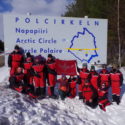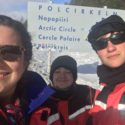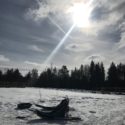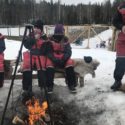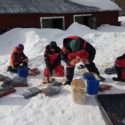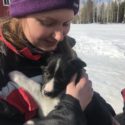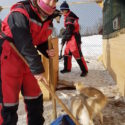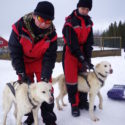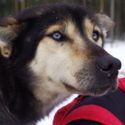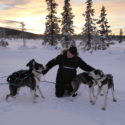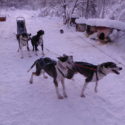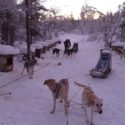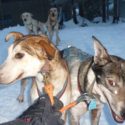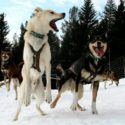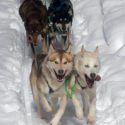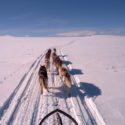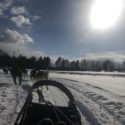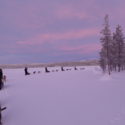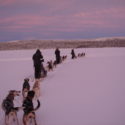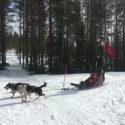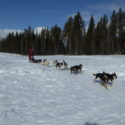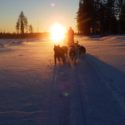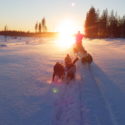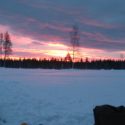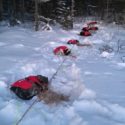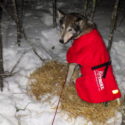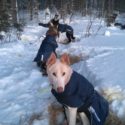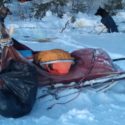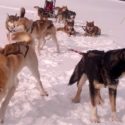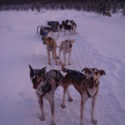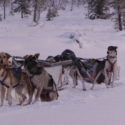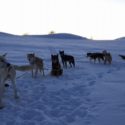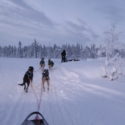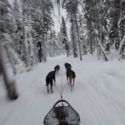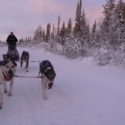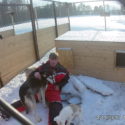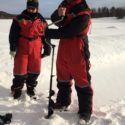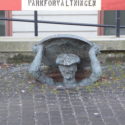As a CCF Adventurous Training Officer, and Winter Mountain Leader I felt privileged to be able to organise, and take a group of Cadets from the Oldham Hulme Combined Cadet Force on their expedition to NE Lapland in Arctic Sweden.
The expedition was the culmination of 18 months hard work by the 11 Cadets and 2 Adult Instructors / Mountain Leaders.
After conducting the final recce, and completing the expedition admin, the group flew to Lulea via Stockholm followed by a 2 hour drive towards the Arctic Circle, for the start of their adventure. Arriving at the kennels the cadets where thoroughly briefed about the weeks training, and skills required before being allowed to take part in the Arctic Circle overnight expedition, and driving their own team of dogs into the Arctic Circle.
The initial briefing covered the week’s training schedule, and animal husbandry needed, followed by a tour of the Kennels /dog yard and puppy play. Later the cadets broke into two groups to clean the kennels or feed the dogs a mixture of Kibble (dried biscuits) and Meat (offal).
After lunch each cadet was driven round a pre-arranged circuit by Nigel or myself, to show them what to expect when driving their dog teams. Having experienced the initial ride, the Cadets paired up, and took turns driving a 4 dog team on a short circuit into the wilderness, which caused much amusement or bruised ego if they fell off, however nobody lost their team – which was a success in itself.
Upon returning to the yard the Cadets returned the dogs to their respective kennels, and undertook the routine kennel duties – checking the dogs over, sorting out all the equipment they had used, and evening feeding plan for the dogs. After dinner the Cadets went through the extra equipment needed by the dogs to undertake their Arctic Expedition which included dog booties, vests, dog coats and wrist warmers.
With all the theory out of the way it was our turn to select our dogs and dress our selected dog with all extra clothing needed – which in itself produced several hours of fun and amusement, as the dogs misbehaved as we tried to dress them. As the days passed, the cadets learnt new skills and became more proficient in their handling of the dogs, not only from a husbandry aspect, but to the preparation, through to driving various sized dog sled teams from 4 to 10 dog in a variety of conditions ranging from undulating forest tracks to open tundra and frozen rivers and lakes, all at an unpredictable minus degrees depending on the time of day we were out.
Not only did the cadets have to learn all the dog care, husbandry, sled preparation and dog sled driving skills and care of the dogs in a wilderness setting, but all the associated skills associated with living in the Arctic wilderness survival skills, ranging from – snow shoeing, wilderness fire lighting, ice fishing, snow shelters and safety of the dogs which is paramount.
After training, kit selection for the dogs and themselves, and with sleds packed, we were ready for our overnight expedition. Leaving the yard the remaining dogs howled, whilst our dog teams barked in sheer excitement, as we released the anchor lines, pulled up and stowed the snow anchor and shouted ready, and with a sudden jolt we were off and racing out of the dog yard into the trees. Taking a sharp left hand bend we started climbing steadily uphill, and as the dogs slowed their pace we continually got off the sled and ran behind to give the dogs a lift before getting back onto the runners. Thus we made our way into the snowy wilderness crossing the frozen Arctic Tundra with only the footfall of the dogs and gentle sound of the runners in the snow for company.
After several hours driving we arrived at our chosen camp site and quickly set about sorting out our dog teams, securing the sleds with extra dog lines, dog coats fitted, fresh straw down for sleeping, dogs’ feet and joints checked, boiling water prepared for the dogs’ food, and of course a hot brew – which was much appreciated by all. Very quickly, with the dogs sorted, we erected our Lavoo tents and as the camp started to take shape we settled into a routine that was to serve us well during the next 36hrs. With the camp fully up and running, we collected firewood for an open fire which we set in a pit in the snow which was over a meter deep. With the fire blazing we set up our tripod and cooked ourselves a wonderful all-in stew, washed down with mugs of hot tea or hot chocolate. As the temperature plummeted to minus 13.5C, we settled down in our new-found accommodation, resting on furs on the hard packed snow, our boots and outer clothes stowed in dry bags to keep from freezing overnight.
After a restful night’s sleep, we reversed the process, starting with the dogs – preparing boiling water for the feed, whilst gathering in the used straw, sorting out our kit, and starting to prepare and pack all non-essential items back onto the sled. Eventually after several hours and with the site swept, kit put away, sleds packed, dogs harnessed and eager to get on the trail again, we set off in a circular route back to the kennels. The drive back went without incident. Leaving the plateau we sped downhill through the trees, over broken ground twisting round many bends as we made our way back towards the kennels. Approaching the kennels, the sound of howling from the yard echoed through the trees which made the dogs pick up the pace, eager to get back home.
By early afternoon, we arrived back in the yard and set about ensuring all the dogs were in good order before returning them back to their pens and sorting out all the kit we had used, whilst enjoying a much deserved mug of tea with lunch before sorting out the evening feeding plan. Later that evening, we tried out our newly learnt skill of Ice Fishing on the Kalix Alven River – however, if our evening meal had depended on our fishing skills we would have gone to bed hungry!
Our final day at the kennels saw the cadets put into practice all the skills learnt during the week, as they took part in a friendly dog sled race/competition, which showed how much had been learnt over the past days, and eventually saw the group driving a 10 dog sled dog team.
After all the excitement at the kennels and the isolation of the forest, we made our way to Lulea before boarding the overnight train south to Stockholm for 36hrs R & R, staying in the old city of Gamla Stam, visiting the old town for shopping, watching the changing of the guard, and soaking up the atmosphere whilst reflecting on our week’s adventure. It had been challenging and rewarding, exciting and stimulating, and made us all eager and wanting more…
It is without doubt that the expedition was a great success, made more so by Nigel and Mel for setting up such a varied and uniquely rewarding experience, and the generous support from both the Ulysses Trust and NW RFCA, which is much appreciated.
Report by Major Ian Blackwood

